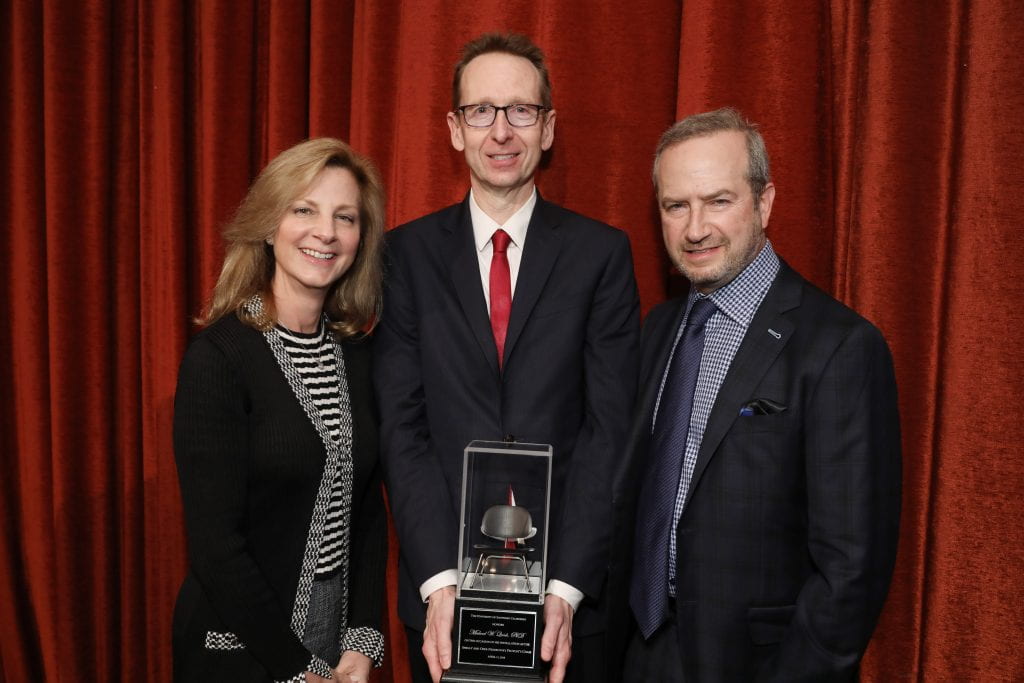Niki and I hope you are enjoying spring! Our campuses are preparing for commencement, as our students prepare for their final exams. There is wonderful anticipation in the air, especially as we have two new programs graduating their inaugural classes. The USC Iovine and Young Academy will see off its first class of innovative minds, 30 extraordinarily curious thinkers who are committed to bettering our world. Meanwhile, USC’s initial class of Bovard College graduates will advance excellence in all fields, and help us better relate to each other and our world.
Nemirovsky Provost’s Chair
Earlier this month, our Trojan Family came together to honor our provost. USC Trustee and alumna Shelly Nemirovsky and her husband, Ofer, generously funded an endowed chair for this position—the university’s chief academic officer—and we formally installed Michael Quick as its inaugural holder. Provost Quick has served in this role since 2015, and in highly imaginative and inclusive ways, fosters interdisciplinary collaborations across our campuses. In endowing this chair, the Nemirovskys showed great admiration for his dynamic leadership, and built on their already stellar legacy at the university. Shelly and Ofer have opened their home in Boston for USC events, and provided a naming gift for one of the eight residential colleges in the new USC Village. They are indeed tremendous friends to USC, and we are so grateful they have created the Shelly and Ofer Nemirovsky Provost’s Chair, which will endure for generations.
USC’s leadership in brain mapping and bioscience
Earlier this month, Niki and I attended the Society for Brain Mapping and Therapeutics’ annual gala, at which I accepted the Humanitarian Award on behalf of the USC community. The evening was a magnificent tribute to our collective advances in brain mapping, as well as to USC’s continued contributions to this important area. In my remarks that evening, I pointed to two particularly far-reaching advances at our university: the USC Michelson Center for Convergent Bioscience, which tackles the most critical health issues of our time, and the USC Stevens Neuroimaging and Informatics Institute, which has gathered the largest collection of brain data in the world—all in its mission to stop diseases such as Alzheimer’s.
APAA celebrates a milestone
Continuing the celebrations, the Asian Pacific Alumni Association marked its 35th anniversary at this year’s scholarship and awards gala. The festive event included Jaime Lee, president of the USC Alumni Board of Governors, who will join our university’s board of trustees in July, and her husband, Matt Cheesebro. I was delighted to speak at this year’s gathering, and to be joined by so many USC trustees: Suzanne Dworak-Peck; Ming Hsieh; Mitchell Lew and his wife, Deena; and Rod Nakamoto and his wife, Elsie. The APAA makes such a difference in so many lives: each year, it grants nearly 100 scholarships to talented USC students!
USC and women in engineering
After our USC delegation returned from our February trip to London, the BBC published a thoughtful story on women in science and engineering, for which the writer interviewed “three people with bright ideas for breaking stereotypes.” Among them was Yannis Yortsos, dean of the USC Viterbi School of Engineering, who was part of our London delegation and spoke of the deep inroads USC is making to recruit more women to engineering. “It’s an economic imperative,” he pointed out. “To be competitive as a nation, you need to engage all of your resources in that competition.” Perhaps more than ever, it is essential to bring more women into the field, as complex technologies such as artificial intelligence and quantum computing require as much talent and creativity as possible.
Greek ambassador visits USC
Last month, Haris Lalacos, Greece’s ambassador to the United States, visited our campus for a very special event hosted by the USC Center on Public Diplomacy. Ambassador Lalacos spoke to our students in Wallis Annenberg Hall, and covered a range of contemporary topics, offering insights on the current state of the Greek economy, his nation’s relationships with its neighbors, and the enduring partnership between the United States and Greece. It was gratifying to see our students interacting with such a prominent and experienced international leader.
Before closing, I wish to congratulate two USC Dornsife faculty members on their recent achievements. Professor Viet Thanh Nguyen was elected to the American Academy of Arts and Sciences, and Professor Steven Ross’ most recent book—Hitler in Los Angeles: How Jews Foiled Nazi Plots Against Hollywood and America—was included among the three finalists for this year’s Pulitzer Prize in history. Both are extremely well-deserved recognitions!
Yours truly,
C. L. Max Nikias
President
